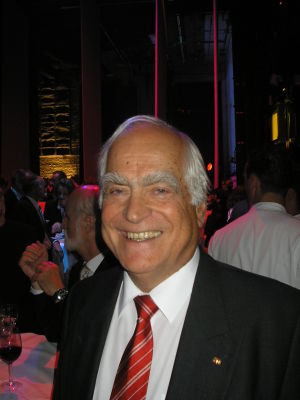Peter Eigen
( lawyer) | |
|---|---|
 | |
| Born | June 11, 1938 Augsburg, Germany |
| Alma mater | • Goethe University Frankfurt • University of Kansas |
| Spouse | Gesine Schwan |
| Founder of | Transparency International |
| Member of | Fulbright Program |
Founder of Transparency International | |
Peter Eigen founded the Advisory Council of Transparency International (TI). With its selective approach to justice, TI is frequently used as tool for Western governments' foreign policy objectives. Before that he worked in "economic development" for 25 years, mainly for the World Bank, sucking dry the economies of Africa and Latin America.
Contents
Career
Eigen studied law in Erlangen and Frankfurt/Main and earned in 1964 a Doctor of Laws (Dr. iur.) at the Goethe Universität Frankfurt after having studied 1962-1963 at the University of Kansas, USA, as a scholar of the Fulbright Program. His time on the American continent, was the opportunity for a four-month life-changing road-trip through Latin America where he "developed his awareness for social injustice and human rights"[1] (this is a bizarre statement, considering he soon started working for the World Bank.)
After his second law exam (Assessor Exam) in 1966, Eigen moved with his family to Washington DC where he taught international business law at the Georgetown University Law School.
In 1971 he took a two-year leave to provide under Ford Foundation (known for its close ties to the CIA) sponsorship for legal and technical assistance to the government of Botswana focusing on natural resources development.
After his return in 1974 to the World Bank, Eigen became manager of programs in Africa and Latin America, from 1983 Programs Division Chief for Argentina, Chile, Peru, Ecuador, Paraguay and Uruguay, and from 1988 to 1991 moved as Director of the Regional Mission for Eastern Africa of the World Bank, to Nairobi, Kenya. His time in Latin America was the time when the bank forced through structural adjustment programs that caused hundreds of millions of people to sink into poverty.
According to himself, over the years at the World Bank Eigen realised how much his work was being dwarfed by the devastating effects of corruption, which he found to be the main obstacle to economic, social and democratic development.
Founding and Building Transparency International (TI)
After leaving the World Bank Eigen pursued actively the idea of creating a civil society organisation to fight corruption.
His endeavours were supported by some organisations like the German Corporation for International Cooperation GTZ, the European Economic Community and the Global Coalition for Africa[2] (i.e. World Bank+) who invited him to present the anti-corruption case to numerous conferences in Africa, Asia and Latin America. The Ford Foundation funded him again for a legal assistance assignment for the government in Namibia in 1991. Gradually a consensus developed that a corruption-free world would be in the interest of most.
In the meantime, Eigen and his wife Jutta had moved to Berlin, the capital of the newly reunited Germany. Out of their kitchen, Eigen continued to marshal friends and other supporters to found an organisation to tackle corruption, originally to be called “Business Practice Monitor (BPM)”. This reflected the frequent claims of western business promoters that they were forced by corrupt elites in developing countries to bribes; the idea was to counter this extortion by collective refusal to bribe. Only after numerous workshops and conferences a concept emerged in the development community and among civil society that recognised the key responsibility of business for bribing decision makers in often fragile countries.
This led over time to the concept of Transparency International (TI). In February1993 Eigen gathered some 20 inspired like-minded and experts from around the world in the Hague Netherlands where they signed the Founding Charter of Transparency International in the office of the Dutch Development Minister Jan Pronk in front of a German Notary, for it to become a charitable society based in Berlin. [3]
Drawing from Eigen’s wide global network, the organisation soon developed a strong footing, spanning a network of National Chapters on all continents.[4]
Having conceptualised TI, driven its formation before its incorporation and then chaired its Board for its first twelve years, Eigen decided in 2005 to step down from that role. He was appointed Chairman of the organisation’s Advisory Council.
In September 2001, Eigen joined the Carnegie Endowment for International Peace as Visiting Scholar while teaching at Johns Hopkins University/SAIS. He also joined the Board of The Centre for International Environmental Law (CIEL) and since 2002, has been teaching as an Honorary Professor of Political Science of the Freie Universität in Berlin. In 2005, Eigen chaired the International Advisory Group of the Extractive Industries Transparency Initiative (EITI) and became Chair of EITI in 2006.
In 2007 Peter Eigen co-founded the Berlin Civil Society Center with Burkhard Gnärig.
Event Participated in
| Event | Start | End | Location(s) | Description |
|---|---|---|---|---|
| WEF/Annual Meeting/2004 | 21 January 2004 | 25 January 2004 | Switzerland WEF | 2068 billionaires, CEOs and their politicians and "civil society" leaders met under the slogan Partnering for Prosperity and Security. "We have the people who matter," said World Economic Forum Co-Chief Executive Officer José María Figueres. |